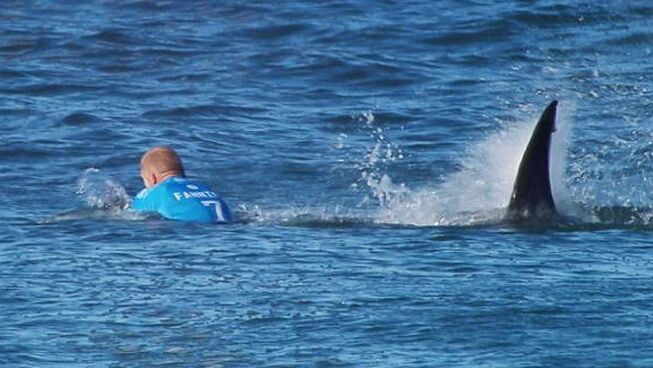In our sport we always think about sharks

It was surreal to watch footage of Mick Fanning's encounter with a shark at the J-Bay Open surf competition. To see the fin in the water behind Fanning, to watch his panicked reaction, and then have the whole scene obscured by a breaking wave! And the relief to see him board a jetski with no injuries.
What cemented my interest was watching his emotional reaction to the whole event. His immediate reaction seemed to be disbelief that he had somehow escaped unharmed ...
"Yeah, someone was looking out for me. To walk away from a shark attack without a scratch on you, it's a miracle, really." @Mick_Fanning
— 702 ABC Sydney (@702sydney) July 21, 2015
He even considered retirement ...
"I'm happy to not even compete ever again. Seriously, to walk away from that, I'm just so stoked"
– Mick Fanning (ABC News)
But his reflections a few days later seem to be a more measured response. He takes a more philosophical line in this Instagram tribute to Julian Wilson, the fellow surfer who paddled to his aid despite the danger ...
He reflects that "In our sport we always think about sharks and know we are in their domain" and anticipates returning to J-Bay some day. And I've heard reports he is now surfing again.
All sports have their risks. I've really enjoyed watching the Tour of France over the last couple of weeks – but I've seen Adam Hansen battle on despite a dislocated shoulder; witnessed a yellow jersey rider retire because of a broken back; felt the pain of Michael Matthews continuing in the race after breaking 3 ribs in a horror crash on Stage 3; and replayed in slo-mo the moment Gerant Thomas disappeared over the side of an embankment during a fast descent.
And it's not just sport. Everyday life has its risks. Professional cyclists accept the risks of their pursuit, but even weekend cyclists like myself accept we might have to battle the occasional SUV in a roundabout.
Life is risky.
One thing that fascinates me about Mick Fanning's escape, literally from the jaws of death, is that I recognise that "There, but for the grace of God, go I". That could have been me.
Another thing that fascinates me is the opportunity to reflect on the bigger questions. Was Mick just lucky? In the wrong place at the wrong time, but escaping anyway. Or was he some sort of hero who should add "shark wrestling" to his CV?
Or was he blessed? Was Mick's suspicion that "someone was looking out for me" true? And why? Why would God look out for Mick? Does God want to see him take the crown and win another Rip Curl Pro title?
Christians reflect on these sorts of questions through the lens of what Jesus and his disciples have to say. While Jesus has nothing to say about surfing, the Bible has a lot to say on the question of whether "someone is looking out for me".
One of the first generation of Christians was James, Jesus' brother. He wrote a letter to some first century Christians advising them on how to live in response to the offer of new life that Jesus makes. Here's what he says to those who make plans with no reference to God.
Now listen, you who say, ‘Today or tomorrow we will go to this or that city, spend a year there, carry on business and make money.’ Why, you do not even know what will happen tomorrow. What is your life? You are a mist that appears for a little while and then vanishes. Instead, you ought to say, ‘If it is the Lord’s will, we will live and do this or that.’
James warns us of the risk of ignoring God.
Whether we are Christian or not, it is self-deluding to make plans as if we are in control. As if we are somehow immortal.
James suggests we ought to acknowledge that our lives are in Jesus' hands. But why would James suggest this? What is the benefit of including Jesus in our plans?
It seems to me there are two reasons. The first is that it a protection against arrogance. Against somehow imagining we are in control. To keep us from investing our plans with more significance than they deserve.
Secondly it gives us hope that our lives can be more than "a mist that appears for a little while and then vanishes". If we aren't in control of our destiny, we need hope that someone is. It's both humbling and uplifting to acknowledge the creator has plans for his creation.
James puts it this way ...
Believers in humble circumstances ought to take pride in their high position. But the rich should take pride in their humiliation – since they will pass away like a wild flower. For the sun rises with scorching heat and withers the plant; its blossom falls and its beauty is destroyed. In the same way, the rich will fade away even while they go about their business.
Blessed is the one who perseveres under trial because, having stood the test, that person will receive the crown of life that the Lord has promised to those who love him.
Believers in Jesus don't look to their immediate circumstances, or even their plans, as a measure of how they are going. The poor run the risk of remaining poor, and the rich face the risk of losing all they have. And both rich and poor face the prospect of death.
Instead, believers look to the promises of Jesus. Jesus promises a crown of life to all who love him, and that gives us hope despite the ups and downs of life.

